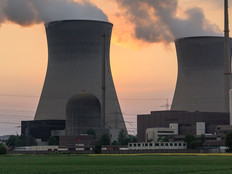What Is the Potential for AI in the Energy Industry?
Artificial intelligence has the potential to transform a multitude of industries, including retail, small business accounting and even product design. The energy and utilities markets could be next.
It’s still early days in terms of adoption, but there are numerous use cases for AI in the energy and utilities industries. AI can be used to make smart electric grids more efficient in delivering energy, can predict when batteries and other equipment will fail and can also help make energy exploration easier and more economical.
AI and one of its subsets, machine learning, are digital trends poised to disrupt the energy industry, according to a recent report from Wood Mackenzie, an energy, chemicals, renewables, metals and mining research and consultancy group, Greentech Media (GTM) reports.
There are potentially massive opportunities for savings. General Electric is looking at how to use AI to optimize how electricity flows out of batteries and points of consumption, Bloomberg News reports. Steven Martin, chief digital officer at GE’s energy connections business, says the tech could eventually save $200 billion globally.
SIGN UP: Get more news from the BizTech newsletter in your inbox every two weeks!
Interest in AI Surges in the Energy Market
Energy companies are still trying to figure out how best to use AI, but one way it could be used is to make smart grids even smarter. Chris Shelton, CTO of electricity distribution giant AES, tells GTM that the company is looking into how the technology can “improve awareness, efficiency and maintenance of the company’s grid systems and assets like solar farms and gas plants.”
Through the use of algorithms, AI-based applications also have the potential to let AES know when those assets are likely to fail or need maintenance. The same concept — preventative maintenance — is currently in vogue in the manufacturing world, as companies look to get ahead of equipment failing in their factories.
AES, GTM notes, manages 36 gigawatts of energy capacity across 17 countries and employs 19,000 people. It generated $14 billion in revenue last year.
AES is interested in advanced neural network design, natural language processing and machine intelligence, GTM reports. “The technology is fascinating because we can overlay it on our existing assets,” Shelton tells the publication.
The assets AES controls, such as a solar or battery farm, generated tremendous amounts of data, and AI algorithms can process that at machine speed to make them run more efficiently, Shelton says.
AI will be the brain of smart grids of the future, Franklin Wolfe, a Ph.D. student at Harvard, writes in a blog post for Harvard’s Graduate School of Arts and Sciences.
“The technology will continuously collect and synthesize overwhelming amounts of data from millions of smart sensors nationwide to make timely decisions on how to best allocate energy resources,” he says. “Additionally, the advances made from ‘deep learning’ algorithms, a system where machines learn on their own from spotting patterns and anomalies in large data sets, will revolutionize both the demand and supply side of the energy economy.”
Using AI, smart meters will be able to constantly monitor electricity demand and supply. “Further, briefcase-sized devices known as ‘synchrophasers’ would measure the flow of electricity through the grid in real time, allowing operators to actively manage and avoid disruptions,” Wolfe writes in his post. “These sensors would communicate with the grid and modify electricity use during off-peak times, thereby relaxing the workload of the grid and lowering prices for consumers.”
In terms of supply, AI can have smart grids lower the usage of fossil fuels if algorithms detect that renewable energy is producing a lot of electricity on particularly windy or sunny days, Wolfe says.
Beyond smarter grids, AI can also help energy firms find energy sources more efficiently through data analytics and other methods. Oil and gas giant Total is exploring the use of AI with tech firms such as Google and Microsoft, Total CIO Frederic Gimenez said at an energy industry conference in September, The Daily Telegraph reports.
“We have a strong knowledge of exploration and seismic analysis. But they are the ones who are the best in artificial intelligence,” Gimenez said. “This has obliged our people to work with completely different partners and to merge our knowledge to find a new way to make oil and gas discoveries.”
Hurdles Remain for AI Adoption
Despite the enthusiasm for AI and machine learning — a subset of AI that uses algorithms to detect patterns, predict outcomes and potentially operate autonomously — energy firms are still early adopters of the technology.
“The barriers for oil companies to adopting new AI technologies are many, ranging from resistance to change, a belief that what they already have is sufficient, and skepticism about whether new technologies will deliver,” Ray Hall, energy sector director at Tessella, a provider of engineering and consulting services, tells ZDNet.
“Many of our own customers have invested in large technology vendors promising the world from analytics, only to be left disappointed with the result,” he adds.
While energy companies are no strangers to using analytics to be more efficient, Hall says that “often they just have not progressed and their approaches are now based around old technologies which lack the ability to incorporate newer analytics techniques such as machine learning to improve performance.”









